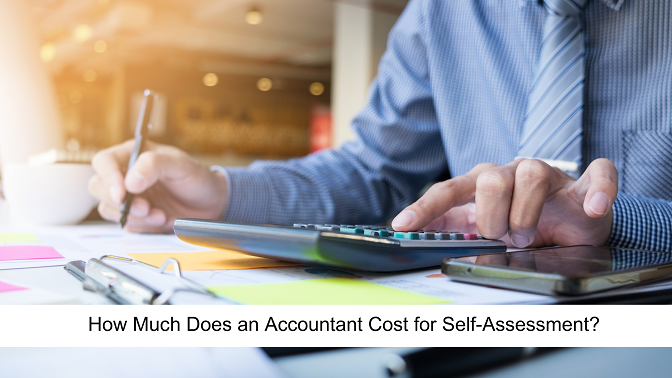
If you are planning to hire an accountant for your self-assessment, you must have the question of how much does an accountant cost. The cost for most people is usually between £150 and £300, depending on your business and how complex your finances are.
The actual amount depends on your business and how complex your finances are. If filling in forms and dealing with tax makes you feel stressed, having an accountant can make things much easier and help avoid mistakes.
How much will an accountant cost for Self-Assessment?
The cost of an accountant depends on how easy or complicated your tax return is.
- Simple returns (£150 - £300): These usually apply to sole traders, freelancers, or individuals with just one source of income.
- Complex returns (£300 - £600+): These apply if you have multiple income streams, rental properties, investments, or run a limited company.
- Location: Fees often vary by region. Accountants in London, Manchester, and other major cities usually charge more than those in smaller towns or rural areas.
- Other factors influencing cost:
- Type of business (sole trader, partnership, limited company)
- Number of income sources
- Extra services needed, such as VAT returns, payroll, or bookkeeping support
- Accountant’s experience, qualifications, and the level of advice provided
The more work involved, the higher the fee. A good accountant can save you both money and stress in the long run.
How Much Do Accountants Charge for Added Services?
If you need more than just a self-assessment tax return, like help with VAT returns, payroll, or regular bookkeeping, many accountants offer monthly packages to keep everything organised.
These packages can save you time and help you keep your finances organised all year round. Here’s what you might expect to pay on average:
- Small businesses: £60 to £150 per month
- Limited companies: £100 to £450+ per month
Why Hire an Accountant for Your Complete Tax Return?
Hiring an accountant for your complete tax return is a good idea because it makes things easier and safer for you. Here are some benefits:
- They do your tax return correctly to avoid mistakes and penalties.
- They help you get all the allowances and expenses you can claim, saving you money.
- They take the stress off your shoulders and save you time.
- You get expert advice made just for your business.
- They help you make sure your business follows HMRC rules correctly.
- Overall, an accountant can save you time, prevent errors, and possibly reduce your tax bill.
- Most importantly, you can relax knowing a professional is handling it all for you.
What Information Will an Accountant Need to File My Tax Return?
To complete your self-assessment tax return, your accountant will need financial information. Having everything ready helps make the process quicker and avoids delays.
Common details include:
- Your Unique Taxpayer Reference (UTR)
- National Insurance number
- Income details (salary, dividends, rental income, self-employed earnings)
- Records of business expenses you want to claim
- Bank interest, savings income, or investment statements
- Pension contributions or other reliefs you may claim
- Capital gains records (if you’ve sold property, shares, or investments)
- P60S, P45S, payslips, or CIS statements (if relevant)
The more accurate your records, the easier it is for your accountant to prepare your return and identify possible tax savings.
Do Accountants Offer Fixed-Fee Pricing?
Fixed-fee pricing means you pay a set amount for a service, with no surprise costs later. It helps you budget easily by knowing the total fee.
Many accountants do offer fixed-fee pricing for self-assessment tax returns, covering preparation, submission, and basic support.
What Services Are Usually Included in Self-Assessment?
Self-assessment services cover everything needed to complete and submit your tax return accurately. Accountants handle your tax details and help ensure you pay the right amount while maximising any allowable deductions.
Common services included are:
- Collecting and reviewing your income and expense information
- Preparing and submitting your tax return to HMRC
- Checking for tax reliefs and savings you may be eligible for
- Answering questions about your return and tax situation
- Providing advice on record keeping and future tax planning
Conclusion
Knowing how much an accountant costs helps you plan your self-assessment with confidence. Whether your finances are simple or complex, using an accountant can save you time, reduce mistakes, and possibly lower your tax bill. Choosing a good accountant means less stress and more accuracy when dealing with HMRC.
Expert Help with Your Self-Assessment Tax Return
Finding the right accountant makes tax returns easier, especially if your finances are complex. At PHS Associates, we handle self-assessment, VAT, payroll, and bookkeeping for individuals, freelancers, and small businesses.
Call 0208 8611685 or email info@phs-uk.co.uk for a free quote and expert support.
Frequently Asked Questions
Yes, an accountant can save you time, reduce errors, and potentially lower your tax bill, making it worth considering, especially for complex finances.
No, accountant fees are personal expenses and cannot be claimed back through HMRC tax relief.
It can be easy if you have simple finances, but it may get complex and time-consuming if you have multiple incomes or business activities
Yes, accountants can help you claim all eligible allowances and expenses to reduce your tax bill legally.
If the fees are related to your business, you can usually claim accountant fees as a business expense to reduce taxable profit.
